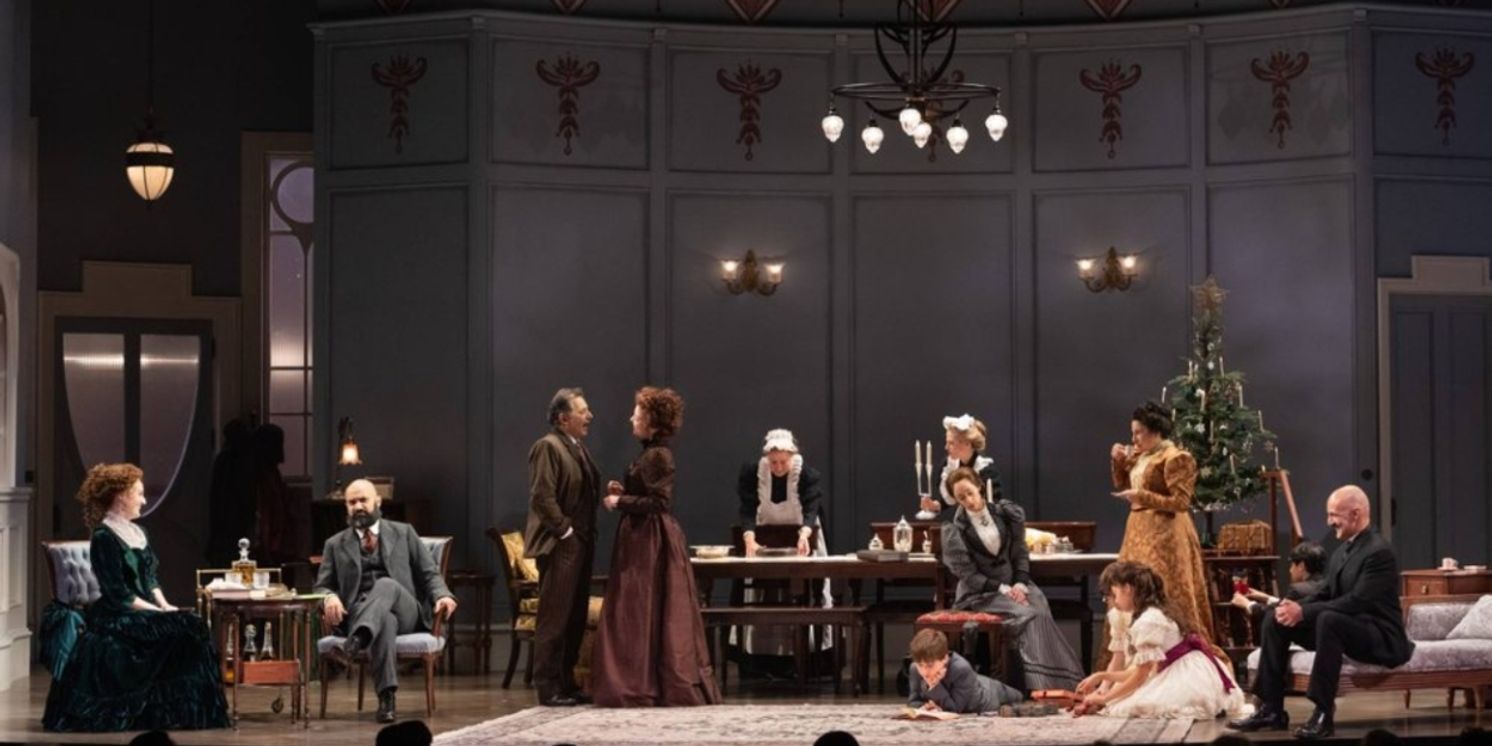Review: The Huntington's LEOPOLDSTADT is Heart-Rending Epic
Tony-winning Tom Stoppard play will be presented through October 13, 2024

Czech-born British playwright and screenwriter Tom Stoppard, 87, was the child of non-observant Jews whose family fled Czechoslovakia during World War II, just prior to Nazi occupation. Stoppard then spent much of his young life in India, and then Nottingham and Yorkshire in England, becoming the very essence of an intellectual Englishman.
It wasn’t until the early 1990s that the celebrated writer learned that all four of his grandparents had been Jewish and had died while imprisoned in Auschwitz and other concentration camps, along with his three aunts on his mother’s side.
With that awareness, the brilliant wordsmith – an Academy- and multi-Tony-Award winner for plays and movies including “Rosencrantz and Guildenstern Are Dead,” “Travesties,” “Arcadia,” “The Coast of Utopia,” and “Shakespeare in Love” – wrote the sweeping “Leopoldstadt,” a fictionalized account of the family he never knew now being given a heart-rending production by the Huntington, in association with Washington, D.C.’s Shakespeare Theatre Company, at the Huntington Theatre through October 13.
The play had its world premiere in London’s West End in 2020, shutting down for a time during the Covid-19 pandemic and reopening there in late summer 2021. A year later, the play made its Broadway debut at the Longacre Theatre, with the run extended through July 2023. It won four 2023 Tony Awards, including Stoppard’s fifth for Best Play.
Set in Vienna over the first half of the 20th century, where a thriving intellectual scene existed amidst growing antisemitism, two brothers-in-law have vastly differing ideas about what is to come in the future – both for their families and for the Jewish people – a strain that will linger for generations.
In Boston, “Leopoldstadt” is being presented, in two acts with an intermission, under the measured, moving, and perfectly executed direction of Carey Perloff who is well-suited to direct this latest, and perhaps final, Stoppard work. In addition to being a director, Perloff is also a playwright and writer. Her 2022 book, “Pinter and Stoppard, A Director’s View,” details her many experiences with contemporary playwrights, including directing 11 Stoppard plays.
Taking place from 1899 to 1955, with stops along the way in 1928 and 1934, the proceedings begin with two connected-by-marriage, white-collar families, the Merzs and the Jakoboviczs, gathered on a December day in the seeming safety of the Merz’s grand living room. Early on, one of the children is reminded that the Star of David is not meant to go atop the Christmas tree.
The large, uniformly superb cast includes those playing characters present in a the first scene, a 1899 family gathering. Among them are: Emilia (the estimable Phyllis Kay); her son and a convert to Catholicism, Hermann Merz (Nael Nacer, whose memorable portrayal of the patriarch of another Jewish family in last season’s “A Prayer for the French Republic” led to the local actor’s being cast in the same role on Broadway); Hermann’s wife, the gentile Gretl (a multi-dimensional Brenda Meaney), who throws caution to the wind for a secret dalliance with non-Jewish cavalry officer, Fritz (Samuel Adams); their school-aged son Jacob (Quinn Murphy on opening night, Elias Wettengel at other performances); Emilia’s daughter Eva (a dignified Rachel Felstein) and son-in-law Ludwig Jakobovicz (the excellent Firdous Bamji); Ludwig’s sister Wilma (Sarah Corey); and her husband Ernst Kloster (Maboud Ebrahimzadeh).
Hermann, perhaps because of his conversion, believes that Austrian Jews are safe, but Ludwig does not agree. He methodically explains the ways in which antisemitism still pervades Austria and how that menace might one day ensnare them. In Ludwig’e eyes, the warmth of the families may not always be enough to stave off the steadily encroaching chill.
In November 1938, that prognostication proves true when a Nazi paramilitary man arrives at their home on what would become known as Kristallnacht, or the Night of Broken Glass, because of the destruction wrought on Jewish businesses, homes, and synagogues. He taunts and abuses the families while instructing them to pack a single suitcase and prepare to leave. It is a terrifying scene, made more so by Samuel Douglas’s ice-cold portrayal of the Nazi. Douglas’s high-pitched voice pierces the air, every sound a jolt to the civility of the lives his character is so cruelly upending.
The drama’s climax comes in 1955 when Rosa Kloster (Rebecca Gibel), the daughter of Wilma and Ernst Kloster and a Freudian analyst who moved to New York before the Holocaust, solemnly recalls each departed family member by name and place of death, which most often was Auschwitz. On opening night, the audience was stilled in silence as the sadness grew into a kind of communal mourning.
Scenic designer Ken MacDonald has created a large, well-appointed living room that also includes a long dining-room table, with formal furniture pieces, impressive lighting fixtures, and abundant leather-bound books, enhanced by Yuki Izumihara’s commanding, sometimes ominous projections, and Robert Wierzel’s lighting.
Alex Yaeger’s costume designs are well-suited to each character and each period, with silk brocade and lacy frills demonstrating their financial status, and properly worn finery evidencing their dignified comportment at every turn.
Photo caption: A scene from the Huntington production of “Leopoldstadt.” Photo by Liza Voll.
Reader Reviews

Videos

